How To Tell If Your Olive Oil Is Fake
By Alice Osborne
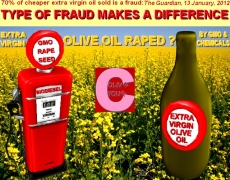 Did you know that almost a year ago a journalist (Tom Mueller) broke the story that more than 70% of the extra-virgin olive oil sold in the world is FAKE (cut with cheaper oils)? I had no idea. Since then olive oil lovers the world over have been scrambling to find authentic, 100% real olive oil.
Did you know that almost a year ago a journalist (Tom Mueller) broke the story that more than 70% of the extra-virgin olive oil sold in the world is FAKE (cut with cheaper oils)? I had no idea. Since then olive oil lovers the world over have been scrambling to find authentic, 100% real olive oil.
And as another result, folks have been trying to figure out on their own how to tell fake from pure olive oil. It's just about impossible though—the folks that are faking this stuff are dang good at what they do!
First comes the taste test. Kristen, food editor on one of my favorite sites, www.foodrenegade.com, reports that several olive oil experts and seasoned chefs say the taste test is unreliable, so don't bother.
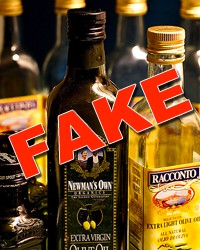 Then there's the fridge test. The premise? Extra-virgin olive oil is comprised of mostly monounsaturated fats which solidify when cold. So, if you put real extra-virgin olive oil in the fridge, it ought to become thick and cloudy. But this won't work because there is extra-virgin olive oil that is a high-wax variety (which would normally solidify when cold), so when it's cut with low-grade oils from other plants, putting it in the fridge will thicken it, but not doesn't it. This fake oil would pass the fridge test because the so-called olive oil STILL thickened up and became cloudy.
Then there's the fridge test. The premise? Extra-virgin olive oil is comprised of mostly monounsaturated fats which solidify when cold. So, if you put real extra-virgin olive oil in the fridge, it ought to become thick and cloudy. But this won't work because there is extra-virgin olive oil that is a high-wax variety (which would normally solidify when cold), so when it's cut with low-grade oils from other plants, putting it in the fridge will thicken it, but not doesn't it. This fake oil would pass the fridge test because the so-called olive oil STILL thickened up and became cloudy.
Another reason the fridge test doesn't work: There is the extra-virgin olive oil that is 100% real, but it's "winterized" (chilled and filtered). Many olive oil producers winterize their oil so it doesn't become inconveniently solid on cellar shelves during the winter. By chilling the oil and filtering out the wax that solidifies or clumps up, they can ensure that their oil is always pourable. This 100% real oil would fail the fridge test, and would only become slightly thick (but not solid) when frozen. So the fridge test just isn't reliable.
Then there's the lamp oil test. Extra-virgin olive oil should be flammable enough to keep an oil lamp burning. It should also burn without producing any smoke. So, if your olive oil doesn't keep a wick lit (or if it can, but produces smoke), you can trust that it's fake. However, there are other oils that can keep a wick lit. So if your olive oil is adulterated with an oil that also burns, it will pass the test even though it's fake. So, like the taste test and the fridge tests, the oil lamp test isn't reliable either.
There's only one sure-fire way to know if your olive oil is fake or real, and that's to know your olive oil farmer. Back to Food Renegade's editor, Kristen, who lives in central Texas (a place where olive groves do relatively well). She actually knows olive growers: "I know these people. They're not mobsters or buyers for multi-national corporations. They're real people with real families who are passionate about what they do!" she says.
Small, local olive farmers produce oil that's always passed every single scientific test of authenticity. So, buy locally, from a farmer you can get to know and trust.
Sensible advice, but what if you can't buy olive oil locally (which describes most of America)? Who can you trust, then? How do you determine if an olive oil you find online or in stores is real or fake?
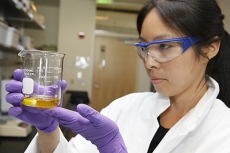 UC Davis wondered the same thing and did a series of studies on this. Their findings? Domestic olive oil from single producers or co-ops was always real. And they suggest, regarding the foreign oil market: buy from growers who bottle their oil directly for retail sale. So these are the folks who should have our business.
UC Davis wondered the same thing and did a series of studies on this. Their findings? Domestic olive oil from single producers or co-ops was always real. And they suggest, regarding the foreign oil market: buy from growers who bottle their oil directly for retail sale. So these are the folks who should have our business.
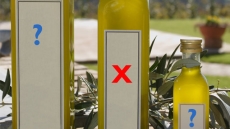 Buying directly from single producers or growers who bottle their oil for retail bypasses middle men—the people who buy olive oil in bulk from individual farmers and collect it in bulk to sell to corporate buyers. These corporate buyers then mix, sort, and brand it under different labels to sell in grocery stores.
Buying directly from single producers or growers who bottle their oil for retail bypasses middle men—the people who buy olive oil in bulk from individual farmers and collect it in bulk to sell to corporate buyers. These corporate buyers then mix, sort, and brand it under different labels to sell in grocery stores.
So, cut out the corporation's middle man (who buys from hundreds of scattered farms and is likely adulterating the oil), go directly to the source—the small family farm or small co-op of growers—and you'll get pure oil.
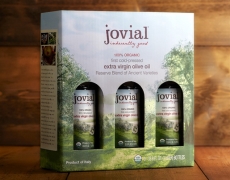 I'll be Googling this topic to find single growers and to compare prices. Meanwhile, Food Renegade recommends a couple UC Davis-approved outlets: California Olive Ranch (www.californiaoliveranch.com) and Jovial Foods (www.jovialfoods.com). BTW: If you've never shopped for olive oil outside a supermarket, prepare for sticker shock. (NOTE: Jovial Olive Oil is on sale for 20% off from now through Dec. 31st.)
I'll be Googling this topic to find single growers and to compare prices. Meanwhile, Food Renegade recommends a couple UC Davis-approved outlets: California Olive Ranch (www.californiaoliveranch.com) and Jovial Foods (www.jovialfoods.com). BTW: If you've never shopped for olive oil outside a supermarket, prepare for sticker shock. (NOTE: Jovial Olive Oil is on sale for 20% off from now through Dec. 31st.)
But for health and flavor benefits, the price of pure olive oil is worth it. Pure, extra virgin olive oil is not only a light and delicate addition to many wonderful dishes, it is one of the most health-promoting types of oils available. Consider:
 Olive oil is high in monounsaturated fat; it improves blood cholesterol levels and lowers the risk of heart disease
Olive oil is high in monounsaturated fat; it improves blood cholesterol levels and lowers the risk of heart disease- Extra virgin olive oil contains polyphenols which act as antioxidants
- The FDA says eating 2 tablespoons of olive oil a day reduces the risk of heart disease
I'll likely start with California Olive Ranch for now. You can type in your location on their website's store locator and find who is carrying their product. My favorite stores all have it, and I can hardly wait to do my own taste test and actually start using the real deal!
- www.halat.com
- www.ciibroadcasting.com
- www.ucdaviscaes.wordpress.com
- www.lifehacker.com
- www.jovialfoods.com
- www.californiaoliveranch.com

Alice Osborne
Weekly Newsletter Contributer since 2006

